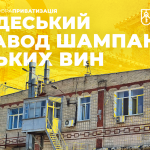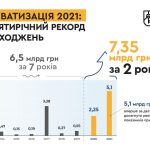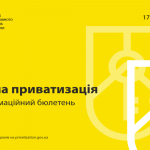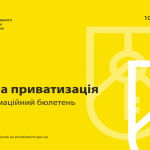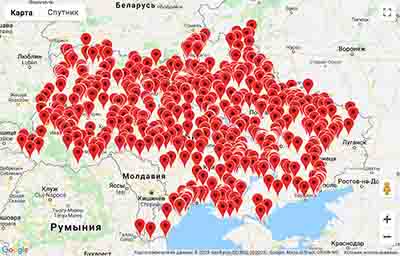General questions
What is privatization? What is the difference between small and large privatization?
Privatization is a sale of state-owned property to private individuals or legal entities. All privatization objects are divided into small-scale and large-scale privatization objects. Objects of small-scale privatization include not only state-owned enterprises and stakes but also objects of unfinished construction and socio-cultural purposes, separate movable and immovable property, the value of which does not exceed UAH 250 million. If the cost of the object is higher than UAH 250 million – these are large-scale privatization objects, to which only state-owned enterprises and share packages can apply. Usually, such objects require more time for pre-privatization preparation, attraction of potential buyers and their familiarization with information about the enterprise.
All objects are sold exclusively through government’s electronic trading system ProZorro.Sale, which is built on the principles of full transparency – the entire sale process takes place publicly and openly to avoid corruption.
What will not be privatized?
- Enterprises that ensure the security of the state.
- Enterprises that are natural monopolies.
- Enterprises that are important to society or whose services/goods cannot be performed by private businesses.
What is the main legislature on privatization in Ukraine?
How to participate in a small privatization auction?
All small-scale privatization objects are sold exclusively through ProZorro.Sale auctions. 7 simple steps to participate in an auction and become an owner of a small-scale privatization object:
- See the list of all objects on the page “Small-scale privatization” of this website, on ProZorro.Sale website or on website of any electronic marketplace that works with ProZorro.Sale and is authorized to participate in sale of small-scale privatization objects.
- Choose an object, study information, and the terms of its sale.
- Register on any of dozens authorized marketplaces connected to the system – bidding information is identical on all marketplaces.
- Apply for participation in an auction through a personal account on marketplace site.
- Take part in an auction and win.
- Pass the qualification.
- Pay the value of an object, sign a purchase agreement.
Who can be a buyer?
Anyone can be an investor – both individuals and legal entities, both residents and non-residents. The ban is for persons associated with the aggressor state or subject to sanctions. There is also a ban on offshore investments without a transparent ownership structure.
More details see Art. 8 of the Law of Ukraine “On privatization of state and municipal property”.
How to get more information about an object?
Information on privatization objects is posted on www.privatization.gov.ua, on the official website of the Fund, on ProZorro.Sale and on authorized websites.
For more information about the object there are virtual data rooms (VDRs). These are repositories of all documents available for the object – from technical passports to documents for ownership and photographs. Their main goal is to simplify access to information, remove corruption when it is received, and increase the transparency of the privatization process.
If after that there are still questions – each object has a contact person responsible for preparing for privatization, as well as a person responsible for physical access to the object. Information about these persons is indicated on the object page.
What is Virtual Data Rooms (VDRs)?
These are repositories of all documents available for each object – from technical passports to documents on ownership, from photographs to financial statements.
Opening of access to information in VDR is carried out for all persons at the same time – after the announcement of the auction. It may take 20-25 days from that date to the date of the auction.
How to get access to the virtual data room (VDR)?
All available documents on objects are placed in virtual data rooms, which are temporarily hosted on the Google Drive platform:
- On separate property: To gain access, you simply need to click on the virtual data room link in the object card on this site.
- On enterprises: Access involves one-time signing of a non-disclosure agreement (NDA) for access to data on all privatization objects.
1) Download on the website and fill in the Application and the Agreement (3 copies).
2) Attach copies of documents to the Application – see description on the website, in the section “How to buy”:
3) Send the Application and the Agreement by mail or bring it in person to the Central Office of SPFU or to any regional branch.
4) After concluding the Agreement, to go to the virtual data room of the object, click on the virtual data room link in the object card on this site
5) One copy of the contract will be sent to the postal address of the potential buyer.
It is also possible to obtain such access, after signing the contract, directly in the premises of the privatization authorities.
Responsible department: Information Disclosure Department: +38 (044) 200-33-09, 200-30-27.
How is the starting price of the object determined?
The starting price is formed at the book value level (for joint stock companies – at the level of the par value of shares). If there is no book value, such value is established on the basis of the value determined in accordance with the Valuation Methodology approved by the Cabinet of Ministers of Ukraine. But with the correct work on the disclosure of information and preparation for privatization, the competition at the auction always forms the market price of the object.
During the period of martial law, in the absence of book value, it is possible to put the object up for sale for 1 hryvnia and give the market the opportunity to determine its real price.
What happens to land plots after sale?
Privatization objects are sold without land. According to the legislation, the owners of the objects on this site have the primary right to register the plot.
About auctions
Where can I find out more information about participation in an auction?
You can contact any of authorized Prozorro Sales marketplaces for information and advice. They provide participation in auctions. Important information on small-scale privatization is published on the Fund’s official website and Facebook page, as well as on privatization.gov.ua and ProZorro.Sale websites.
How to choose a marketplace for participation in the auction?
Information about an announced auction is identical at all marketplaces. Choose a marketplace for your ease of use and quality of service.
What is the cost of marketplace services?
The same tariffs for participation in an auction are established for all marketplaces. It depends on a cost of an object and ranges from 1% to 4% for small-scale privatization.
Can a newly created company participate in an auction?
One of the mandatory documents for a winner’s qualification is the availability of financial statements for a last quarter or an year. As the practice shows, newly established companies may not always have the appropriate documents (Article 14 of the Law “On privatization of state and communal property”).
What financial statements should be submitted by a company to participate in an auction?
The application for participation should be accompanied by an annual or quarterly financial statements. Forms of such statements must be registered by the relevant authority and indicated in the receipt of acceptance. Lack of financial statements with the relevant receipt of its acceptance is the basis for the privatization body not to approve an auction protocol or not to sign a purchase agreement.
What is an English auction?
An English auction is a typical auction for price increase. English auction consists of 3 rounds, where each participant has an opportunity to increase previous bid, and 3 minutes is given for the decision-making to each participant. The peculiarity of this auction is that the participant who set the highest price goes last and sees all competitors’ bids.
What is a Dutch auction?
A Dutch auction is an auction where a starting price of an asset at first declines (usually this type of an auction is determined for assets which price is difficult to estimate) until one of the bidders is willing to buy an asset at that price. Then the price at which the decline was stopped is considered the starting price, and all participants have an opportunity to compete for the asset in 1 round.
How is a winner determined?
In all types of auction (both English and Dutch), a winner is the bidder who made the highest bid during the bidding.
What happens if an auction does not take place?
The law provides for a model of four auctions, which automatically follow each other, only if the previous one did not take place, that is, there was not even 1 application for participation. The first auction is held 5-20 working days after the publication of the information notice. If the auction did not take place, the next auction is announced automatically within 1 working day and is held after 10-15 working days (3-6 days during martial law).
1. English auction to increase the price (Auction without conditions or auction with conditions). The starting price is 100% (initial price).
2. English auction to increase the price (Auction with a decrease in the starting price). The starting price is 50% (of the initial price).
3. Dutch auction for price reduction (Auction by the method of step-by-step reduction of the starting price and subsequent submission of price offers). The starting price is 50% (of the initial price).
4. Dutch auction for price reduction (Auction by the method of step-by-step reduction of the starting price and subsequent submission of price offers). The starting price is 50% (of the initial price).
In all types of auctions (English and Dutch), the winner is determined by the bidder who placed the highest bid during the auction.
What is guarantee fee?
These are funds contributed by a potential buyer to ensure the fulfillment of his obligation to participate in the auction in the form of cash or a bank guarantee.
It is 20% of the starting price of the auction. In the event that 2 auctions for the object did not take place due to the failure of the winners to fulfill their obligations, at the Dutch auctions, the guarantee fee must be in the amount of 30 minimum wages or 50% of the starting price (whichever amount is greater, will be the guarantee fee).
What is registration fee?
These are funds in the amount of 0.2 of the minimum salary as of January 1 of the current year – for objects of small privatization (10 minimum salaries – for objects of large privatization), which is deposited for registration of an application for participation in privatization by a potential buyer to the relevant account of the electronic platform operator, which transfers them to the budget within 5 working days from the day of the auction.
Are the guarantee and registration fees refundable?
A guarantee fee will be refunded if you lose in an auction, and if you win it will be taken into account as part of a payment. A registration fee is non-refundable.
How long does 1 round of an auction last?
Each bidder has 3 minutes to bid, so the duration of 1 round of an auction will depend on the number of participants.
Is an auction took place if there was 1 application for participation?
Yes. In this case, 1 participant who submitted this application receives the right to buy out the privatization object.
Why do you need an auction protocol?
An auction protocol records all important details of an auction, in particular, lists all participants, names the organizer, includes payment details. The protocol also indicates the final value of the asset and prescribes all additional payments with certain amounts for the winner .
Can a bidder refuse to buy an asset after winning an auction?
Yes, but his guarantee fee will not be refunded. Such participant and its final beneficiary are deprived of the right to participate in further auctions for the sale of this object.
How much time does it takes to sign an auction protocol after the end of the bidding?
An auction protocol should be signed and approved within 10 working days from the day following the day of its formation in the trading system (7 days – during martial law).
How much time is there to pay for the privatization object?
The winner pays its bid (minus guarantee fee) in accordance with the data in the auction protocol within 20 working days from the day following the day of the protocol formation.
How much time does a winner have to sign a purchase agreement?
25 working days from the day following the day of formation of the auction protocol, but after payment for the object.
Can the borrowed (credit) funds be used to finance the purchase?
In case of acquisition of the object at the expense of the credit funds, the buyer must also submit information about the relevant creditor, as well as documentary confirmation that such a creditor agrees to provide the appropriate amount of financing in the event that such a participant becomes a winner of the auction. A creditor should meet the same criteria as the buyer, mentioned in Article 8 of the Privatization Law.
In which cases a privatization institution does not approve an auction protocol or does not sign the purchase agreement?
The privatization body does not approve an auction protocol or does not conclude a sales contract if the buyer:
- does not meet the requirements of Article 8 of the Privatization Law;
- did not submit mandatory documents or information;
- provided false information;
- refused to sign the protocol on the results of the electronic auction or the sales contract;
- did not pay the sale price of the privatization object on time.
In which cases it is necessary to obtain a permission of the Antimonopoly Committee of Ukraine?
In cases provided for by the legislation on protection of economic competition, the buyer is obliged to obtain approval from the Antimonopoly Committee of Ukraine to directly or indirectly acquire shares in the amount that ensures the achievement or excess of 25 or 50 percent of votes in the supreme governing institution of the relevant entity, as well as assets in the form of a single property complex or structural unit of a business entity. Concentration may be carried out only with the prior approval of the AMCU or the administrative board of the AMCU in cases of exceeding the thresholds set out in Article 24 of the Law on Concentration.
Privatization of the alcohol industry
How many distilleries will be listed for sale?
The state will put up for sale 41 places of activity (distilleries) that are part of the SOE “Ukrspirt”, 37 plants that are part of the “Ukrspirt” Сoncern and other objects.
In what format are distilleries being privatized, what is Operating Locations (OPs, МПД)
Operating Locations (OPs, МПД) are places of production activities and storage of alcohol of SOE “UKRSPYRT” is provided. Because each such object (plant) is not a legal entity per se, an OP is, in fact, a group of separate property, including buildings, equipment, movable property, etc., that is capable of providing a full production cycle.
What are the privatization conditions?
Initially, until 01.07.2021, the conditions of privatization, in accordance with the Government program, included: preservation of the type of activity until 01.07.2021, preservation of at least 70% of production personnel until 01.07.2021, and maintenance and/or access to civil defense facilities (if present).
Currently, in accordance with Law No. 1914-IX dated 30.11.2021 “On Amendments to the Tax Code of Ukraine and other legislative acts of Ukraine on ensuring the balance of budget revenues”, buyers must pay off debts from salaries, to budgets, social taxes, overdue payables of SOE “Ukrspyrt” in the amount of 100% of the balance sheet value of the acquired property as of the last reporting date by transferring the amount to the account of SOE “Ukrspyrt”. That is, the only condition is repayment of debts, the amount of which will be equal to the starting price of the object of privatization. This amount is indicated in the conditions of privatization, in the information notice document on the sale of the object of privatization.
What can be produced in a distilling plant?
The plant can simultaneously produce one of the following types of alcohol:
- Non-denatured ethyl alcohol (simultaneously, a plant can produce any ethyl alcohol without the content of denaturing additives: rectified (food) alcohol, technical alcohol, raw alcohol) and products that contain it: alcohol spirit and liquor beverages, alcohol vinegar).
- Denatured ethyl alcohol and products based on it: detergents, dissolvents, antiseptics, perfumes and cosmetics products, etc.
- Bioethanol and its raw material (raw materials for bioethanol), biofuels.
By-products of alcohol production are biogas, protein forage products and carbon dioxide.
How to get a license for the production of alcohol and alcohol beverages?
- Licenses for the production of alcohol beverages (spirits and liquors) can be obtained by enterprises of any form of ownership.
- Obtaining a license for the right to alcohol wholesale costs UAH 500,000 annually, and is issued within 10 days.
- Obtaining a license for the production of alcohol takes no more than 30 days from the application date and requires an annual fee of UAH 780.More details: on “How to get a license” webpage.
Question about foreign investors
Can a non-resident submit documents for participation in the auction in Ukrainian with the applicant's signature and seal?
Yes, it can.
Can the buyer be a non-resident legal entity registered in a state classified as offshore zones, but having a transparent ownership structure?
It is possible, however, the submitted documents on the ownership structure of the potential buyer must contain all the comprehensive information available about the persons of the ultimate beneficial owners of the potential buyer of the privatization object and data that disclose them 100% and allow them to be identified.
Can a non-resident pay the value of the object in foreign currency?
Yes, it can. In accordance with parts two and three of Art. 23 of the Law of Ukraine, non-residents may pay the value of the object in national currency or in freely convertible currency. You can pay from the buyer’s account in a Ukrainian or foreign bank.
In the case of freely convertible currency – the amount is determined at the official exchange rate of hryvnia to such currency, set by the NBU on the day of the contract.
How to pay the guarantee and registration fee to a non-resident?
Contributions must be paid from the potential buyer’s account with a Ukrainian or foreign bank.
Is there an established form of certificate with information on the ultimate beneficial owner?
The law does not define the requirements, templates, forms of registration of the document on the ownership structure of potential buyers. However, taking into account the requirements of paragraph 5 of part 2 of Article 8 of the Law, the submitted documents on the ownership structure of a potential buyer must contain all the comprehensive available information about the persons of the ultimate beneficial owners of a potential buyer of the privatization object. The submitted documents and information about the ultimate beneficial owner must contain information and data that discloses it 100% and allows identification.
How is the translation of documents certified?
Documents issued in accordance with the legislation of a foreign state must be legalized (consular legalization or apostille) in the prescribed manner, unless otherwise provided by international treaties.
Is it possible to provide in the agreement that all disputes related to the execution of the agreement are resolved in arbitration of the country of the non-resident participant or in another international instance or in court?
By agreement of the parties, the contract may provide the possibility of resolving disputes in connection with the sales contract or on the basis of it, in the international commercial arbitration court. At the same time, if the parties have not reached an agreement on the choice of such a court, any dispute, disagreement or claim is subject to final resolution by arbitration in accordance with the Arbitration Rules of the Arbitration Institute of the Stockholm Chamber of Commerce.

